Diplomatic Bluebook 2017
Chapter 4
Japan's Diplomacy Open to the Public
2.Strengthening Foreign Policy Implementation Structure
While the security environment surrounding Japan has become increasingly severe, and diplomatic challenges are diversifying, Japan's foreign policy implementation structure is not sufficient compared to other major countries. As the host country of Tokyo 2020 Olympic and Paralympic Games, it is necessary to enhance the foreign policy implementation structure so that it will be equivalent to that of major countries. Under such recognition, MOFA is enhancing overseas diplomatic missions such as Embassies and Consulates General, advancing restructuring of the Ministry as well as developing personnel structure.
Diplomatic missions overseas, such as Embassies and Consulates General, not only represent Japan but also play a key role in diplomatic areas, such as information gathering on the diplomatic frontline, provision of information to the public overseas, promotion of diplomatic relations, and international contribution. At the same time, they are also responsible for operations directly related to the improvement of benefits for Japanese nationals, such as protecting their lives and safety, providing support for Japanese companies, promoting investment and tourism, and securing energy and other resources.
In January 2017, Japan established Embassies in four countries: Samoa, Albania, the Former Yugoslav Republic of Macedonia (FYROM), and Mauritius. MOFA also established a Consulate-General in Bengaluru (India) in January 2017. The establishment of the five diplomatic missions overseas in these five countries is significant for Japan in terms of the following viewpoints.
Samoa is one of the major countries in the region with the largest population in the Polynesian region. Samoa has the Secretariat of the Pacific Regional Environment Programme (SPREP), along with the regional offices of the Food and Agriculture Organization of the UN (FAO) and the UN Educational, Scientific and Cultural Organization (UNESCO). Thus, Samoa is important as the center of information gathering and strategic communication in the region. It is also an important country for Japan, as it has been supporting the Japanese position in the international arena to date, among other matters.
Albania is the base for Albanians, who widely live in the southern part of the West Balkans (with a total population of approximately six million). Albania has an important role in the stability and development of the region. The strong impact of Albanian immigrants (approximately 3.5 million people) in Europe and the U.S. and rich mineral resources also give significance to the country.
After independence, the Former Yugoslav Republic of Macedonia (FYROM) continues reform efforts, aiming at joining the EU and NATO. Strengthening the relationship with the FYROM is an important context for Japan in order to strengthen relations with the EU and NATO. Japan is also one of the biggest donor countries to the FYROM.
Mauritius is a stable democratic country with a good business environment. In the future, it is estimated that the country will be a hub of information and people from abroad as a relay point for investments in Africa, so a potential for Japanese economic activities is expected.
Bengaluru (India) is the center of India's rapidly growing IT industry. The numbers of Japanese nationals and companies in the region are growing rapidly, giving rise to the need for building a structure which constantly provides Japanese nationals and companies in the region with swift and thorough protection, as well as consulate and corporate support services.
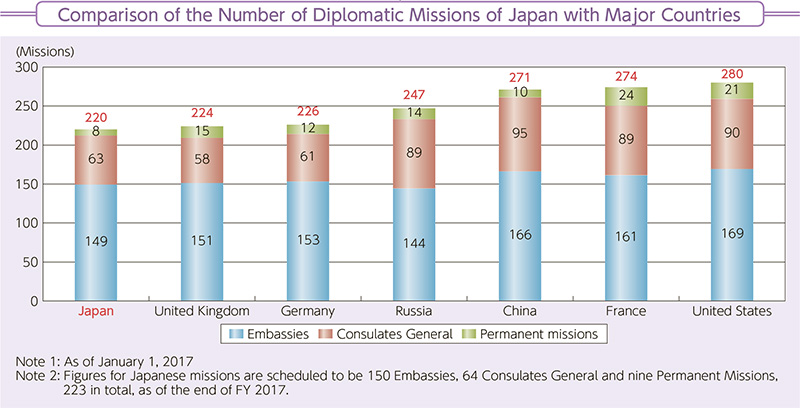
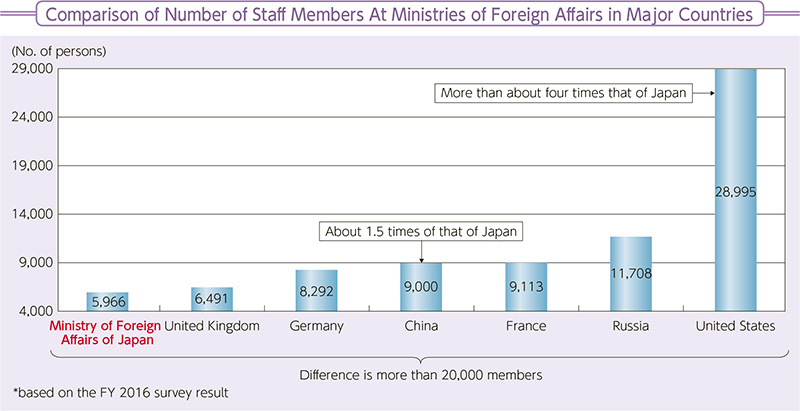
As of FY2016, the number of the diplomatic missions overseas1 is 220 (149 Embassies, 63 Consulates General and eight Permanent Missions). The number is still fewer than that of other major countries such as the U.S. (280 missions) and China (270 missions).
In FY2017, to further strengthen the foreign policy implementation structure, Japan will establish an Embassy in Cyprus.
Cyprus is an EU member state, but it is close to the Middle East. Its geopolitical significance has been growing in recent years as the result of such factors as the destabilization of the state of affairs in the Middle East and the flow of refugees into Europe. Moreover, timely information gathering and local response is necessary since it may serve as a destination for evacuation in the case of an emergency in the Middle East or Africa.
Japan also plans to establish a new Consulate-General in Recife, in Northeast Brazil, which has gained increasing importance in the Brazilian economy. The region to be under the jurisdiction of the Consulate-General is home to approximately 180,000 Japanese immigrants and descendants, or Nikkei, and is an important region for strengthening ties with the Nikkei community, which Japan attaches importance. Japan also plans to establish a Permanent Mission of Japan to the African Union (AU) in Addis Ababa (Ethiopia). It is from the view that Japan places great importance on strengthening relations with the African Union Commission (AUC), the executive organ of AU, and also with the respective African countries to further promote support for the development of Africa through the Tokyo International Conference on African Development (TICAD) and efforts regarding important policy issues such as UN Security Council reform.
In addition to the establishment of more diplomatic missions overseas, it is important to secure and increase the number of staff members to support diplomacy at the diplomatic missions overseas and MOFA. As for the number of staff members, given the government's policy to reduce the overall personnel expenses across all ministries in the light of the current severe budget situation, MOFA set the number of staff members to be 5,966 in consideration of the importance of strengthening the foreign policy implementation structure including bolstering safety measures, the implementation of “Japan's foreign policy that takes a panoramic perspective of the world map” and the promotion of economic diplomacy, as well as the result of bolstering the International Counter-Terrorism Intelligence Collection Unit established in MOFA. This number is, however, still insufficient, when compared to that of other major countries. MOFA continues efforts to build a structure suitable for our national power and diplomatic policy. In the meantime, based on the understanding that enhancing the foreign policy implementation structure remains necessary in FY2017, MOFA plans to increase its staff members by 99 persons in order to address important issues such as bolstering safety measures for Japanese nationals overseas and strengthening the functions for gathering terror-related information, further expansion of the “Proactive Contribution to Peace” initiative, and promotion of economic diplomacy and supporting the overseas activities of Japanese nationals, as well as strategic provision of information.
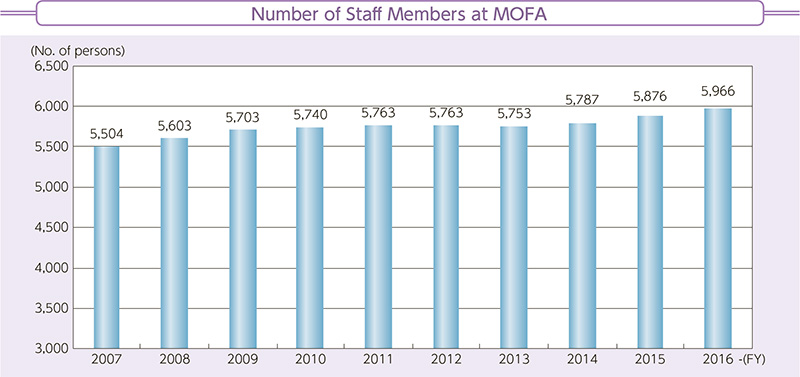
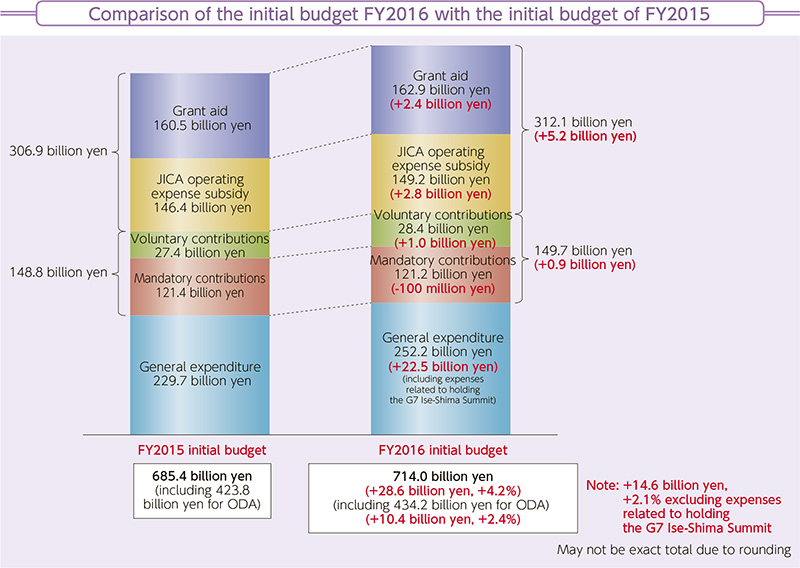
MOFA appropriated a budget of 714.0 billion yen in the budget for FY2016 (an increase of 4.2% from FY2015) to support the foreign policy implementation structure and as the G7 presidency and non-permanent member of the UN Security Council to further strengthen the “Japan's foreign policy that takes a panoramic perspective of the world map” under “Proactive Contribution to Peace” based on the principle of international cooperation. The total amount of MOFA's FY2016 supplementary budget was 193.5 billion yen, with 25.0 billion yen being budgeted as an economic measure for bolstering safety measures for Japanese nationals abroad, full response to risks from the UK leaving the EU and for supporting overseas development of infrastructure, etc. A budget totaling 168.5 billion yen was allocated as additional financial demand for humanitarian/ counter-terrorism/ society stabilization assistance, including measures to solve refugee issues, and support for responses to global issues including natural disasters and infectious diseases. By identifying the following key issues and to significantly strengthen the foreign policy implementation structure and further expand ODA that contributes to the national interest to undertake such issues, MOFA's FY2017 initial government budget proposal appropriated 692.6 billion yen: (1) safety measures against terrorism and other threats for Japanese nationals abroad and within Japan, (2) dealing with and increasingly opaque international state of affairs, (3) diplomatic efforts to propel the Japanese economy including the regions, and (4) strategic communication.
In order to promote Japan's national interests, it is essential to strengthen the foreign policy implementation structure. Japan will strategically continue to proceed enhancement of foreign policy implementation structure, so that it will be equivalent to that of other major countries, while further streamlining the structure itself.
- 1 Diplomatic missions that have a physical office with one or more full-time employees
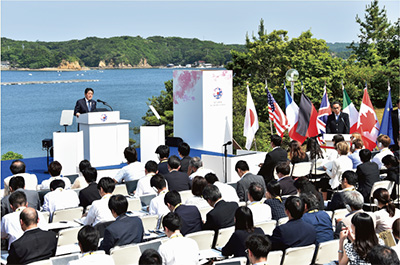 Presidency press conference by Prime Minister Abe (May 27,Mie Prefecture)
Presidency press conference by Prime Minister Abe (May 27,Mie Prefecture)As the whole world turned its eyes to the G7 Ise-Shima Summit, the Government of Japan communicated a wide range of messages to the world through direct communication by Prime Minister Abe, Presidency briefings, foreign journalist invitation programs and press tours.
Prime Minister Abe contributed an article to the Wall Street Journal before the Summit. The Presidency press conference held by Prime Minister Abe at the end of the Summit was aired by major media outlets including NHK, CNN and the BBC.
During the Summit, at the International Media Center (IMC), MOFA communicated actively and thoroughly to foreign media through initiatives such as six Presidency briefings on the content of each session by the Press Secretary for Foreign Affairs.
In addition to the discussions at the Summit, MOFA conducted pre-Summit press tours to Hiroshima Prefecture and Mie Prefecture for foreign media and also invited overseas reporters and TV production teams in order to showcase the attractiveness of Japan, such as Japan's natural surroundings, society, and traditional culture to the world. These efforts led to coverage by the British and Italian media of Ise-Shima's natural beauty and the local traditional fishing of ama female divers. MOFA also invited 11 reporters from 11 countries including India, the Philippines, Malaysia, Bangladesh and Papua New Guinea, and two TV production teams, who covered high-quality infrastructure, health, and women's empowerment, which were key agenda items at the Summit.
Through these efforts, the appeal of Japan, including its culture and initiatives, was conveyed broadly worldwide. These initiatives were not only covered by major media outlets in G7 member countries, but also through media outlets in Asia, Africa, the Middle East and elsewhere.
For the G7 Hiroshima Foreign Ministers' Meeting, Foreign Minister Kishida made contribution articles in the media outlets of four countries, including Le Figaro of France. This was to communicate to the world that the G7 would take the lead in addressing issues faced by the international community including initiatives towards “a world without nuclear weapons.” The image of G7 foreign ministers laying wreaths at the Cenotaph for Atomic Bomb Victims in the Hiroshima Peace Memorial Park was reported by media worldwide.
 Presidency briefing at the G7 Hiroshima Foreign Ministers' Meeting
Presidency briefing at the G7 Hiroshima Foreign Ministers' Meeting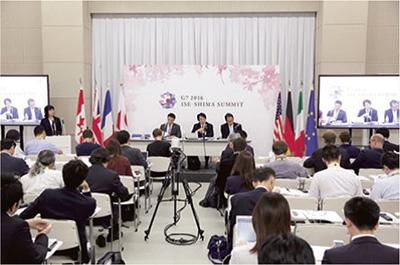 Presidency Briefing
Presidency Briefing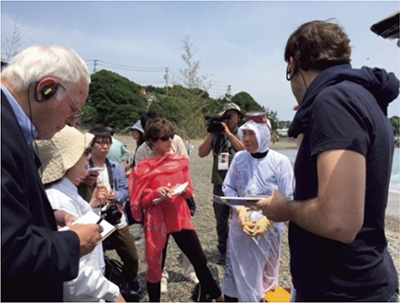 Invited journalists covering ama traditional female divers
Invited journalists covering ama traditional female divers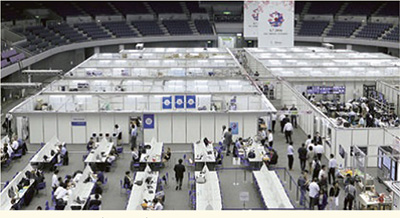 International Media Center
International Media Center
